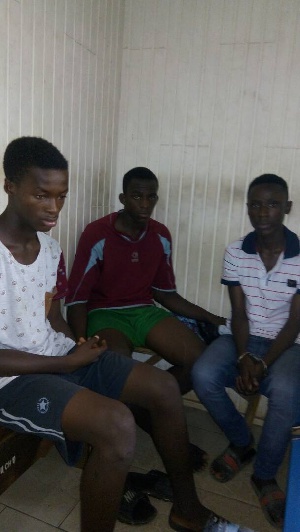 Three of the 7 boys have been arrested by the Ashanti Regional Police
Three of the 7 boys have been arrested by the Ashanti Regional Police
From all indications, gang rape or rape, in general, is not something new in Ghana, although in the contemporary social media age it appears it has assumed an alarming proportion in the society.
It’s not clear whether the seeming gang rape culture—where girls/women are always at the receiving end of some males’ insecurities—has a lot to do with the weak criminal justice system, ineffective law enforcement, a culture that views females as sex objects or all of the above. What is clear, however, is that rape in all its facets is not only depressing but also animalistic and barbaric.
It is why the country’s criminal justice system and law enforcement agencies must roll up their sleeves and get to real work—as any civilized nation will do—with the support of parliament passing up-to-date laws to meet the fast emerging societal vices such gang rape, including its digitization, as well as public decency on the airwaves and on social media. Across cultures, all societies have their fair share of social excesses or criminal acts. In Ghana, from galamsey, mob (in)justice, systemic corruption, to gang rape, the country has sunk deep or is fast degenerating into pseudo law and order culture.
Appallingly, the perpetrators of these moronic acts often have the temerity to digitize or video-tape everything onto the social media platforms. By recording and posting the horrific ordeal on social media, it is as if the rapists callously want their victim(s) to undergo re-traumatization of the raping experience once again. Perhaps the beneath-the-radar culture of gang rape has desensitized the potential rapists to the trauma their victims will likely go through.
Thus, when a close friend in Toronto, Canada, sent me the horrendous video showing some three/four “animals” in human bodies attempting to gang rape helpless, beautiful, young female in Bantama, one of the key suburbs in Kumasi, I became consumed with anger, disappointment, embarrassment, and sadness.
The embarrassment and disappointment stemmed from the fact that I grew up in Bantama and had most of my “cyto” or elementary/middle education in Bantama. So, the friend knew where he was coming from when he teasingly wrote boldly under the video: “LOOK AT YOUR PEOPLE IN BANTAMA!” Honestly, I couldn’t finish watching the gang rape sickness on that video. It was too nightmarish and grotesque to watch such an act in this civilized times.
As despicable as it was to subject another human being to this humiliatingly inhuman way as in Bantama case just because the person or victim is female, there is considerable number of people who strongly shares the view that gang rape, though beneath the surface, is widespread across Ghanaian society over the decades. Almost everyone who went to secondary school in Ghana in the late 1970s, 1980s, and possibly to this date knows or has heard about “gala” before.
Originally, Gala is back-to-back knockout soccer games played in the same day to find an all-round champion. Thus, the gang rape version of “gala” is derived from the back to back soccer competition; and, mostly males/students used it as slang or street term to describe a bunch of boys forcefully taking turns to have sexual intercourse with one female back in the day. In boarding high schools, some years ago, the incidence of “gala” or gang rape was not uncommon. Perhaps the difference between the past and today is that back then students/rapists didn’t have access to social media to post their gruesome acts for the civilized world to see.
Obviously, gang rape or “gala” has deep roots in Ghanaian culture; especially, beginning from the nation’s secondary/boarding schools, some male students have engaged in “gala” before and got away with it. Meaning that it doesn’t matter how we try to deny as we love to do in Ghana, the gang rape activity involving the boys in Bantama is emblematic of a far-reaching phenomenon within Ghanaian subculture. This is not in any way trying to justify an unjustifiable behavior of the Bantama gang rapists but just to remind ourselves about the cold reality that gang rape is not a recent occurrence cropping up in modern Ghana.
The question is: What do we learn from this festering age-old social canker of gang rape that seems to have eaten deep into the moral structure of the Ghanaian youth culture, to say the least? First, there is the need for incorporation of “character education” into the school curriculums nationwide, starting from elementary school to the SHS level, at least. Character education is that which emphasizes essential human traits such as morality, honesty, strong work ethics, time management, even personal hygiene, and also trying to do right when no one is watching you, self-discipline, or all those character traits that coalesce to help make one successful individual in every human endeavor.
Second, the average Ghanaian must learn not only to understand and appreciate the culture but also familiarize with the significance of what it means to be law-abiding citizen. Plus, the basics of the criminal justice system in Ghana must be taught early on in high schools like is done in the advanced countries such as the United States. Suffice to say, there should be posters and other printed leaflets pasted in more conspicuous places in all the nation’s high schools spelling out the legal consequences of gang rape, state corruption, campus violence, and many more.